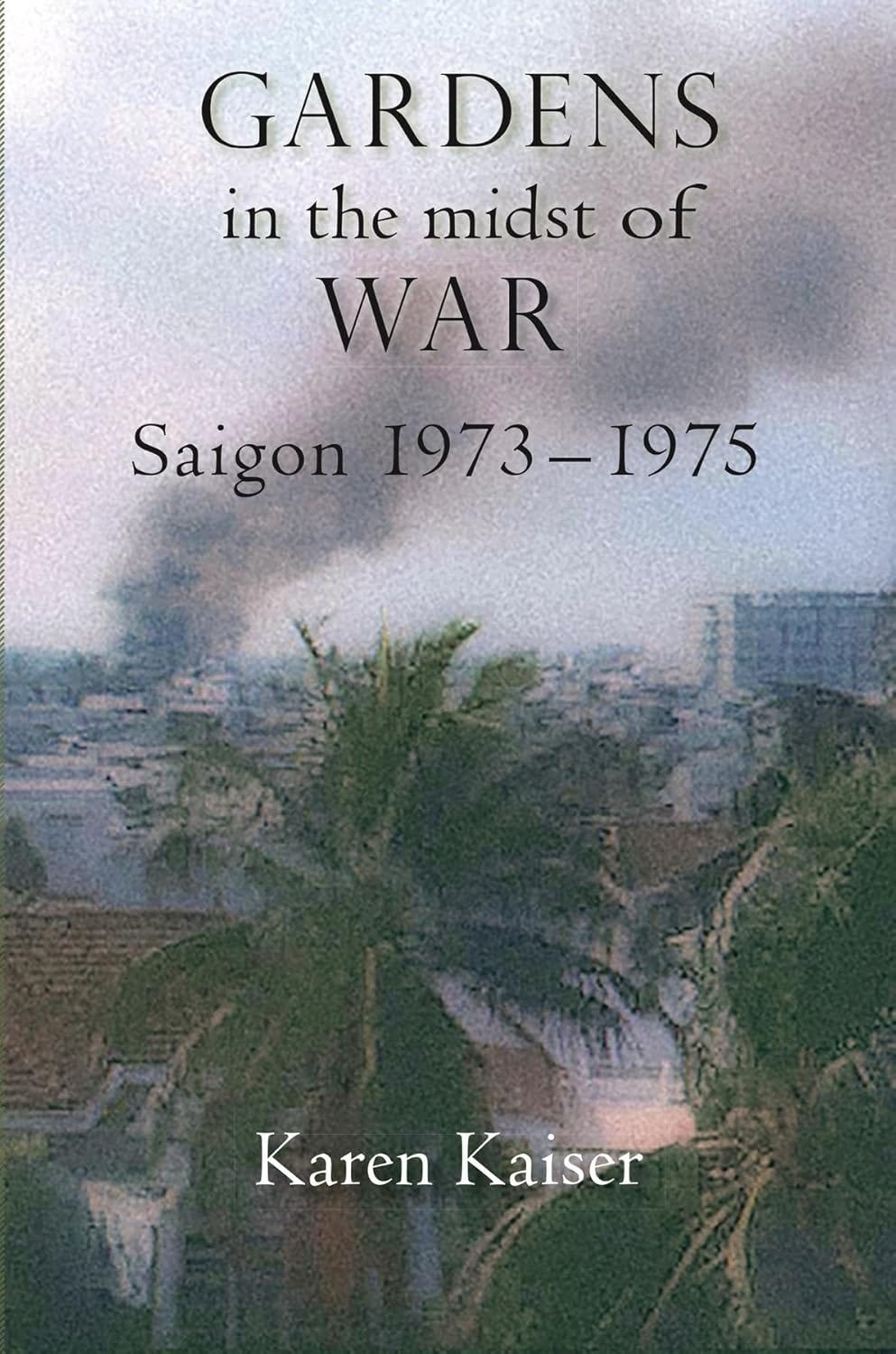FAITH, AND TRUST, AND PIXIE DUST
November chapter excerpt from Karen Kaiser's "Gardens in the Midst of War"
Note from “Stories of Vietnam” curator, Kat Fitzpatrick:
November is suddenly here and I’m pleased to introduce the month with another excerpt from Gardens in the Midst of War: Saigon 1973-1975. This memoir was written by Karen Kaiser (formerly Griffith) who was the librarian at the school I attended in Saigon in the 1974 -75 school year. Her book is especially precious to me because it brings to life circumstances and conditions that escaped my 8-year-old’s understanding but that surely impacted me nonetheless.
Excerpt from CHAPTER 21: FAITH, AND TRUST, AND PIXIE DUST
November 1974
Sài Gòn calmed after the [Anti-Thieu] riots, but nightly artillery fire continued. Rumors of brutal fighting in the Mekong Delta and Central Highlands signaled trouble elsewhere. U.S. Ambassador Graham Martin considered the South Vietnamese Army to be in good shape, able to hold the line, and that there would be a negotiated settlement to the war. Other embassy officials predicted serious trouble ahead.
In Bangkok, to visit the International School, I settled into my room at the Erawan Hotel. The elegant establishment hosted clientele from all over the world. It amazed me to be among them. No longer a teenager curled up on her parent’s sofa, seeing the world through National Geographic photographs, I lived it!
Traveling the world, however, was not without risks. Ever since Steve dropped me off at Tân Sơn Nhứt airport yesterday, his instruction to stay in Bangkok if “something happened” in Sài Gòn nagged me.
Why? What does he think could happen?
I stored Steve’s words in the back of my mind and prepared for the school visit.
Betty Van Dyne, the children’s librarian at the International School, set aside an entire morning to show me around. A mature, energetic, and friendly forty-something, she surprised me—I’d expected someone closer to my age. Her enthusiasm for the job radiated like a heat wave. I wanted to emulate her.
The school featured a modern, American-style library with up-to-date furniture, audio-visual equipment, and rows of stacks filled with books.
Could Phoenix Study Group’s library hope to match this?
Betty’s main concern was the unique needs of expat American kids.
“Adjusting to a foreign culture is a real problem for some of them,” Betty said. “The families move every few years. Relocating within the U.S. isn’t too hard on them but coming to a place like Thailand is another story. It’s all new.”
“Yes, I’ve seen that in my school, too. They have to learn a whole new way of operating—a new language, making local friends, learning to appreciate a new culture—it’s hard enough for adults, let alone kids. I experienced that myself.” I said.
“There’s a lot of stress on the families. The more information they have, the better the chances they’ll adjust well. Let me show you my favorite tool. The kids love it, and they share it with their families. It helps.”
I expected an elaborate program or piece of equipment, but Betty’s favorite tool was a simple four-drawer vertical file cabinet. Folders, arranged alphabetically by the names of the countries that made up southeast Asia, filled every drawer. Inside the folders, travel brochures, postcards, and colorful literature offered an easy and creative way for students to begin an exploration of their new home.
The tour over, I thanked Betty for her time and offered to return the favor should she venture to Sài Gòn. If I’d felt better, I would have accepted her invitation for dinner at her home. Another time I told her I needed to head back to my hotel and rest. Lightheaded, realizing that my dream of seeing the world was coming true, I fell into a deep sleep until morning.
The following day, I treated myself to shopping at the Nightingale-Olympic department store, a treasure trove of elegant objects and delicious goodies not available in Sài Gòn. I bought good cheese, a few toiletries, and my favorite perfume, Fidji, by Guy LaRoche.
Later, I ordered dinner in my room. Women’s lib notwithstanding, I felt uncomfortable eating alone in the dining room. Besides, the terrible sinus infection left me exhausted and constantly blowing my nose. Not good company.
In the morning, I returned to Sài Gòn with my treasures and a batch of travel brochures and postcards to begin a vertical file like Betty’s.
Even with its wonky furniture, the Phoenix Study Group library looked like a school library. Still, I needed to address the guts of the operation—the book collection and the card catalog—so it would function like one.
The school had recently moved, and the books remained in their packing boxes. Before I could order new titles, I needed to undertake the painstaking job of inventorying the books on hand, checking their titles against the card catalog, and organizing them. Nothing brought me more satisfaction than creating order out of chaos, and I dug in with gusto.
One morning, while I was head-down, deep into the project, Superintendent Broadbent appeared in the library. He carried a large cardboard box full of donated paperbacks and informed me he wanted them processed—fast.
Donations of books don’t always thrill librarians who spend several years learning to be discerning in book selection. I didn’t understand why he’d made these particular books a priority. Maybe the donor was an influential parent or board member. I didn’t ask.
The interruption felt more like an intrusion. Tamping down a few choice words, I told him I’d do my best. He left the box on the floor next to my desk. A few days later, I looked over the contents.
Most of the paperbacks turned out to be too adult for the age group the school served, and, like a sorcerer, I made them disappear. I held no power over most circumstances surrounding my life in Sài Gòn, but I had control over that small thing, which made my day.
The Catholic orphanage served as an indication of how desperate and miraculous life could be for some. A couple we knew adopted a baby girl from the orphanage who was the most pitiful child I’d ever seen.
Sores covered her emaciated little body. During the first week out of the orphanage, the new parents discovered she had pneumonia and needed to be hospitalized.
The doctors at the Seventh Day Adventist Hospital resorted to shaving her head to find a spot to insert intravenous lines, her arms and legs being too thin. She was one of the lucky ones and would get the care she needed to thrive.
Her adoptive parents had already taken in three other girls who were turning into lovely young women and a little boy they found abandoned in the market in equally bad shape. This couple had transformed him into a healthy, energetic child.
The idea of taking on such a challenge terrified Steve and me. I could fix a damaged library, and Steve could fix a damaged highway department, but taking responsibility for a damaged child was frightening. What if we made huge mistakes? They wouldn’t be so easy to correct. As much as we admired our friends, adoption wasn’t for us.
~*~
Excerpt taken from the 2023 publication of Gardens in the Midst of War, by Karen Kaiser. You can purchase a Kindle or print copy by clicking here.
About Stories of Vietnam:
Hello, my name is Kat Fitzpatrick and I share a unique panorama of stories about Vietnam.
Stories from the country,
stories from the time of war,
and stories that might expand our horizons.
I hope you’ll join me in honoring this wealth of stories
as we approach the 50th anniversary of the end of the Vietnam War.








